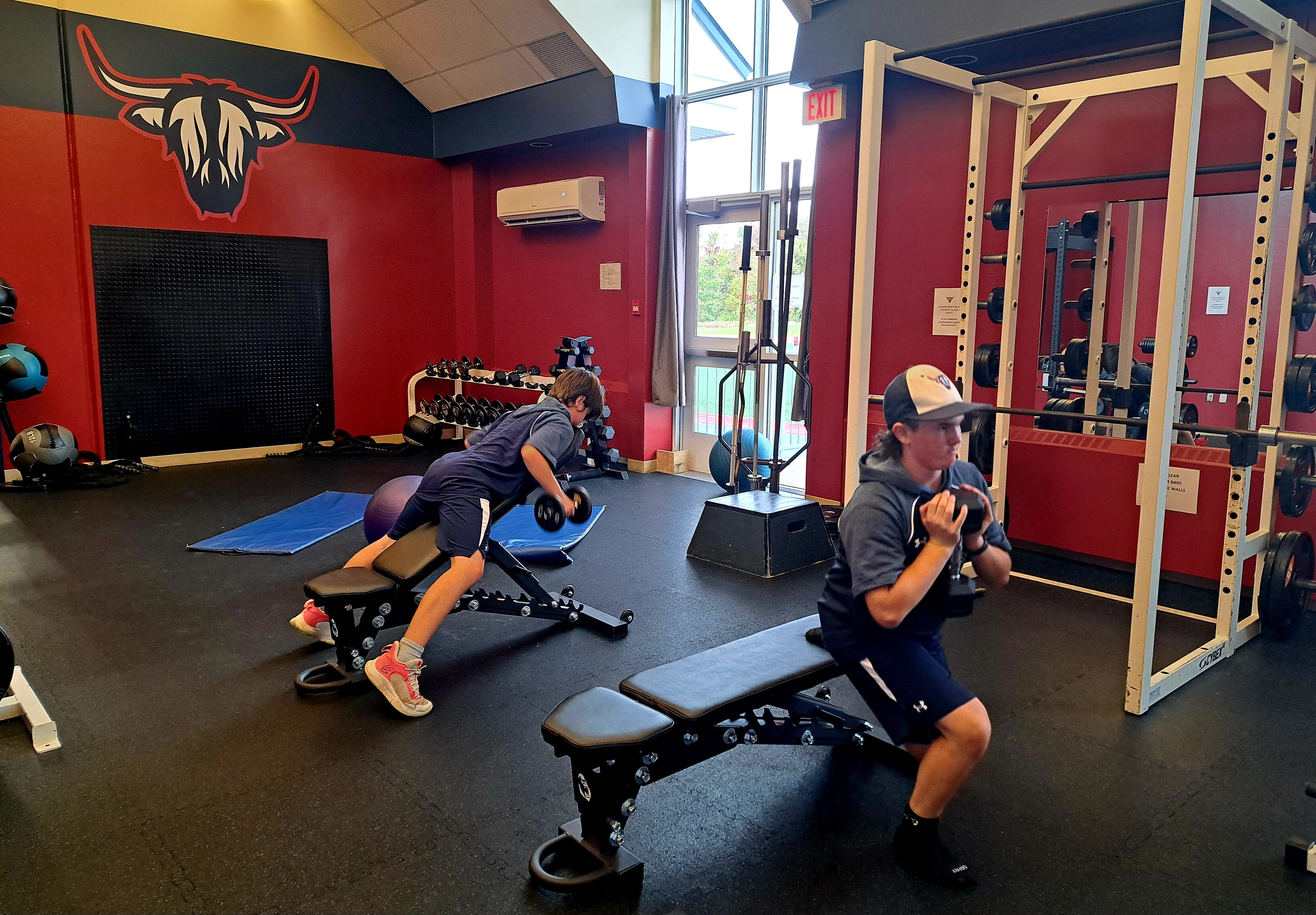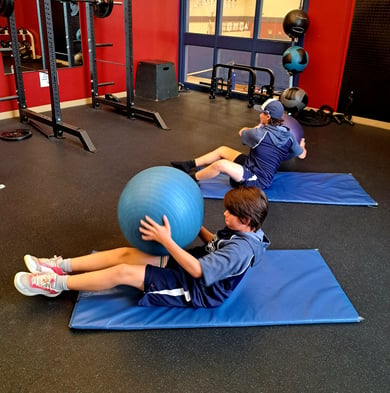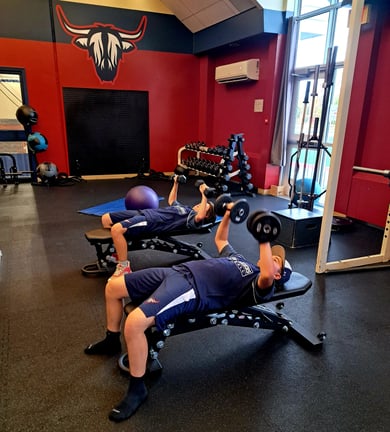Inside King's-Edgehill School

To Lift or not to Lift? That is the Question.
Strength training has become a staple in many athletes’ quest for improved athletic performance. In addition to improved performance, increases in muscular strength and decreases in sports related injuries are among the top of the list of benefits for participating in a strength training program.
If you have the opportunity to enter our athletic centre on campus in the early hours prior to the start of the school day, or in the evenings after supper, you will witness a fitness centre and weight room filled with our students lifting weights with friends and teammates with various goals of becoming stronger, healthier, and better athletes.
A topic that at times has been quite controversial is whether young athletes should strength train, with myths surrounding physical and physiological safety being two major concerns.
The purpose of this article is to provide information intended to educate parents, coaches and athletes on the benefits of starting a strength training program, the appropriate age to start, and how to ensure your young athlete is working with a qualified coach. It is also my goal to help dispel some of the common myths surrounding young athletes lifting weights.
In this article, the term young athlete, or child will be referring to both children and adolescents. Children refers to individuals from age two to the onset of puberty. Adolescents are those at the onset of puberty to the end of pubertal growth, approximately 18 years old. (1)

What is strength training?
Strength training (also known as resistance training) is a type of exercise that causes your muscles to contract against an outside resistance. That resistance can come from a variety of sources such as one’s bodyweight, free weights, resistance bands, and weight machines. (2)
It is important when we discuss youth strength training that we are not confusing it with bodybuilding or weightlifting, sports that prioritize increases in muscle mass, physical composition, and maximum weight lifted. In comparison, strength training for young athletes should always focus on the quality of movement and exercise technique, with the ultimate goal of enhancing physical literacy and performance.
Is it safe for children to strength train?
Misinformation regarding children strength training has not only circulated throughout media, but also within the medical profession. You have probably heard a couple of the more common myths such as “lifting weights will stunt your growth” or “children lifting weights is dangerous and will lead to injury”.
There is no evidence that appropriate strength training at a young age leads to injury of a child’s growth plates. On the contrary, resistance training can provide improvements in bone density and strengthening of the tendons and ligaments surrounding the joints. (3)
If prescribed properly and under qualified supervision, the incidents of injury while lifting weights is very low. Common culprits of injury while training are the result of improper exercise technique, lifting maximal loads (too heavy), and lack of supervision. In fact, research has shown that higher percentages of injury in children occurs while performing their sport compared to participating in a strength training program. (4)

How young can they start?
I have coached children as young as 10 years old in the weight room.
It is my professional opinion, that if your child is old enough to begin participating in organized sport, they are old enough to begin preparing their bodies for the rigors of that sport. This training can be as simple as basic bodyweight movements (squats, push-ups, skips).
However, another factor we must examine is, in addition to level of physical maturity, what is their level of physiological or cognitive maturity. Can they take instructions and feedback? Are they able to focus in a group setting with their peers or one-on-one with an adult? Do they understand the importance safety plays in the environment they will train in? These are common questions I pose to parents when deciding if their child is ready to begin a formal training program.
A quality long term development program will take into account the following:
- Chronological age of the child (how old they are).
- Maturation age of the child. Children that are the same age can have different maturation ages. A 12-year-old male hockey player can have a maturation age range of 10-14 years depending on where they are in their development. This is evident when you look at a team of young athletes all the same age but of varying heights, weights, and muscular builds.
- Training age of the child. Years of experience strength training constitutes an individual’s training age. A 15-year-old basketball player with no training experience would have a training age of zero. That same athlete could have started lifting weights at age 12, therefore giving them a training age of three years.
It is crucial that coaches and parents embrace and recognize the importance these developmental ages play in the safety and efficacy of a strength training program for children.
What type of exercises should children perform?
Exercise selection is dependent on the experience and physical capabilities of the child. For those starting out, mastering movements overcoming their own body weight is beneficial and appropriate. From there, free weights, machines, and light barbells can be introduced. Technique should always be prioritized over the amount of weight that is being lifted, keeping in mind that some children will progress at different rates compared to their teammates. It is also the reason that supervision is of the utmost importance as children unsupervised tend to try to lift heavier on their own with improper form.
How do I know if a coach is qualified to work with my child?
Choosing a qualified strength and conditioning coach is important in the education, development, and safety of your child. Being a sports coach, or having played university or professional sports, does not qualify someone to train children or athletes. Look for a coach with proper education and credentials. Two of the top strength and conditioning coaching credentials are the CSCS from the National Strength and Conditioning Association and the CSCP from the Canadian Strength and Conditioning Association. These credentials require post-secondary education in specific fields and require completion of a comprehensive exam and internship experience. A qualified coach will discuss all medical conditions and past injury experiences prior to the start of working with your child. Don’t be afraid to ask questions regarding a coach’s education and background, as the coach should be able to articulate their philosophy and coaching methods with children and athletes.
What are the benefits of strength training for children?
A major benefit of starting at a young age is that it will allow appropriate progression to more advanced training and movements as a child ages.
The following are some of the well-known physical and psychological benefits to strength training for children.
- Increases in muscular strength and power
- Improvements in coordination and balance
- Decreases in sports related injuries
- Increases in bone density and health
- Improvements in body composition
- Improvements in self-confidence and psychosocial wellbeing
- Improvements in sports performance
- Acquisition of skills that will foster lifelong healthy habits
In conclusion, children participating in strength training has been a widely debated topic. However, researchers, medical professionals and qualified strength and conditioning professionals agree that not only is it safe and effective, but can improve a child’s mental wellbeing, contribute to a healthy lifestyle and improve performance in sport.
References
References
(1) https://www.scienceforsport.com/youth-strength-training/
(2) https://research.med.psu.edu/oncology-nutrition-exercise/patient-guides/strength-training/
(3) https://www.stanfordchildrens.org/en/topic/default?id=weight-room-no-longer-off-limits-to-kids
(4) https://www.ncbi.nlm.nih.gov/pmc/articles/PMC3483033/
Shauna Forsyth is the Head Strength and Conditioning Coach for the KES Highlanders hockey and baseball programs and is the current Vice President of the Canadian Strength and Conditioning. She has coached athletes as a certified strength and conditioning specialist for over 20 years, working primarily with athletes of junior and high school age.
In addition to her numerous strength and conditioning certifications, she holds a bachelor’s degree in Athletic Therapy and a master’s degree in applied Exercise Science, specializing in Strength and Conditioning.
Shauna Forsyth
Head Strength and Conditioning Coach







